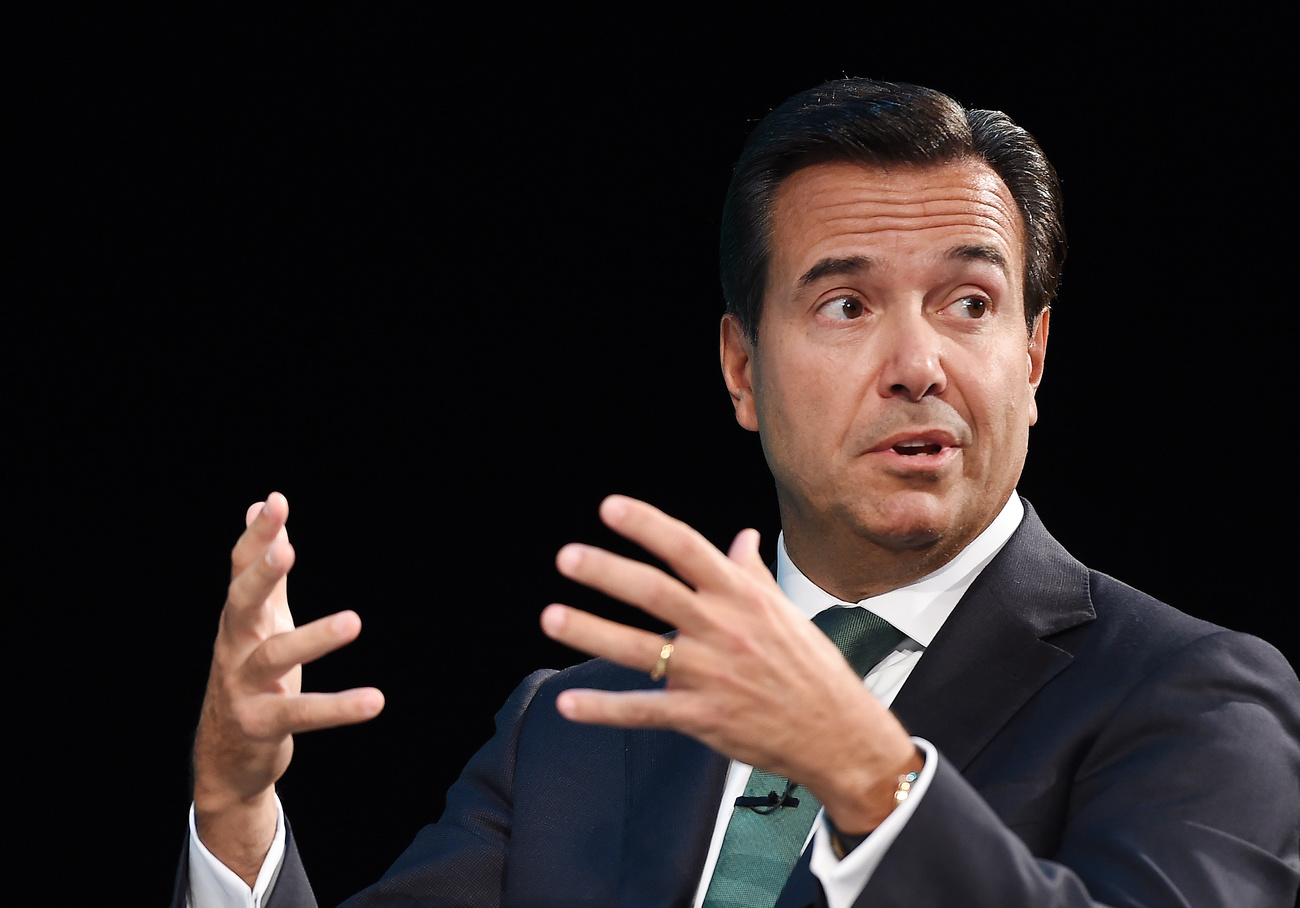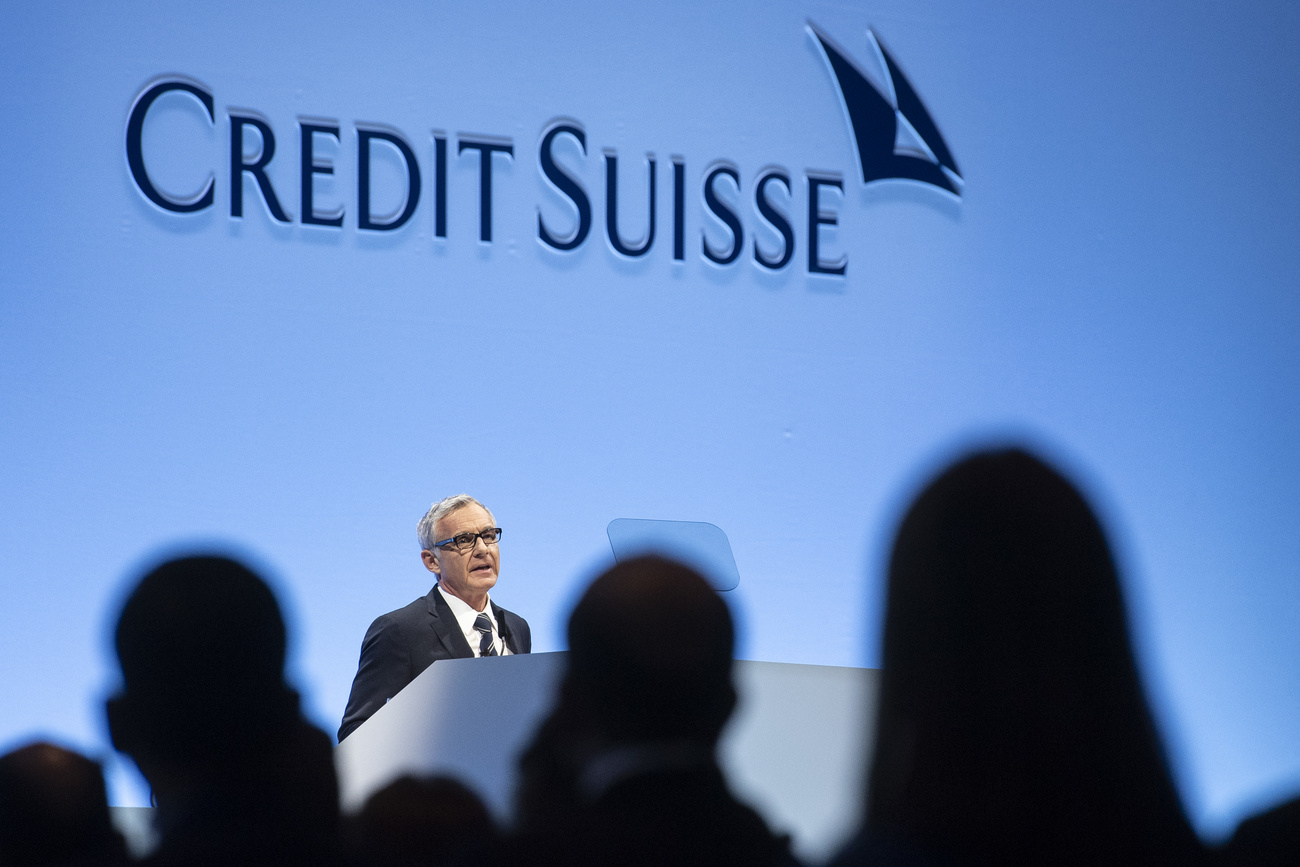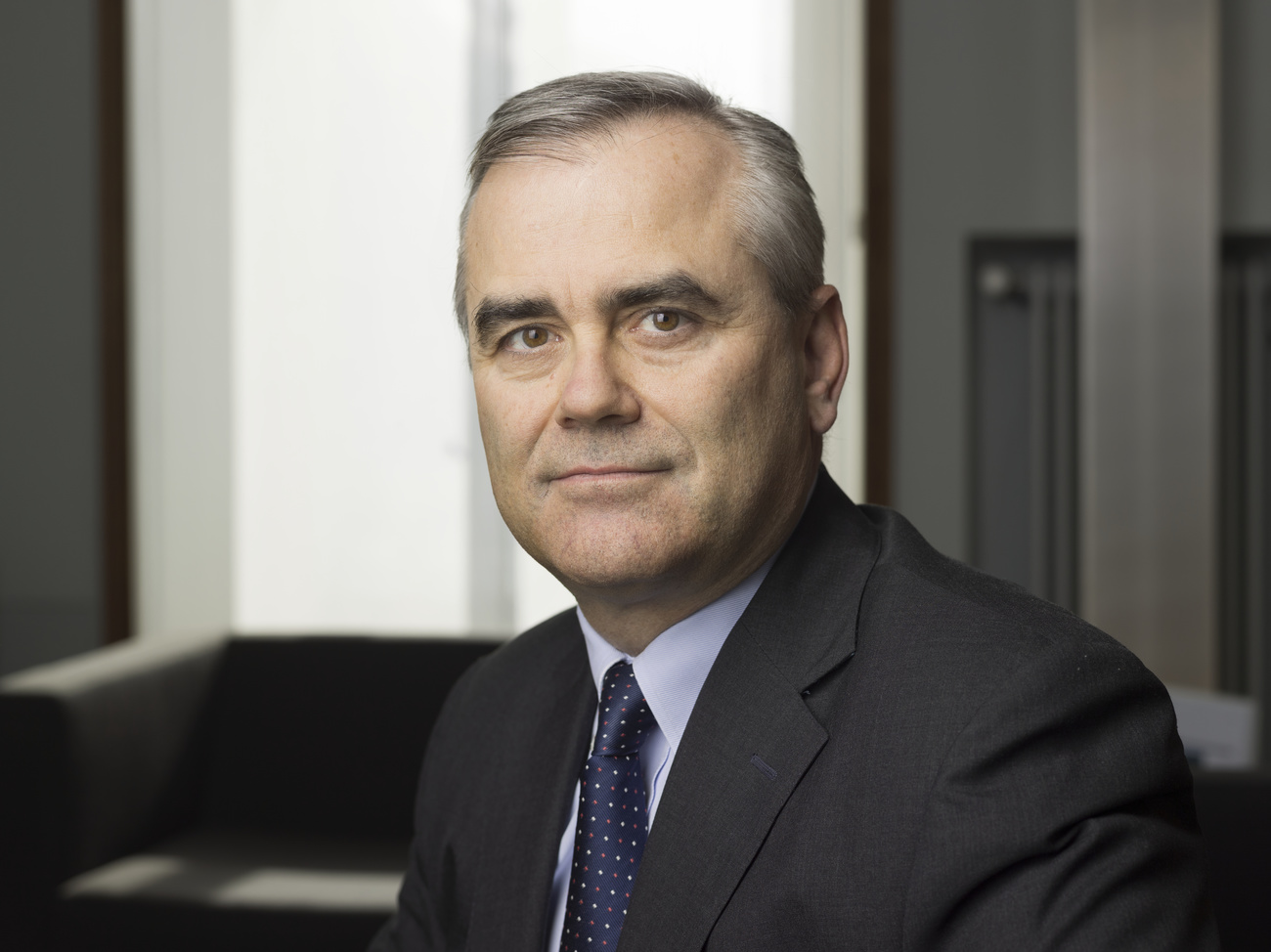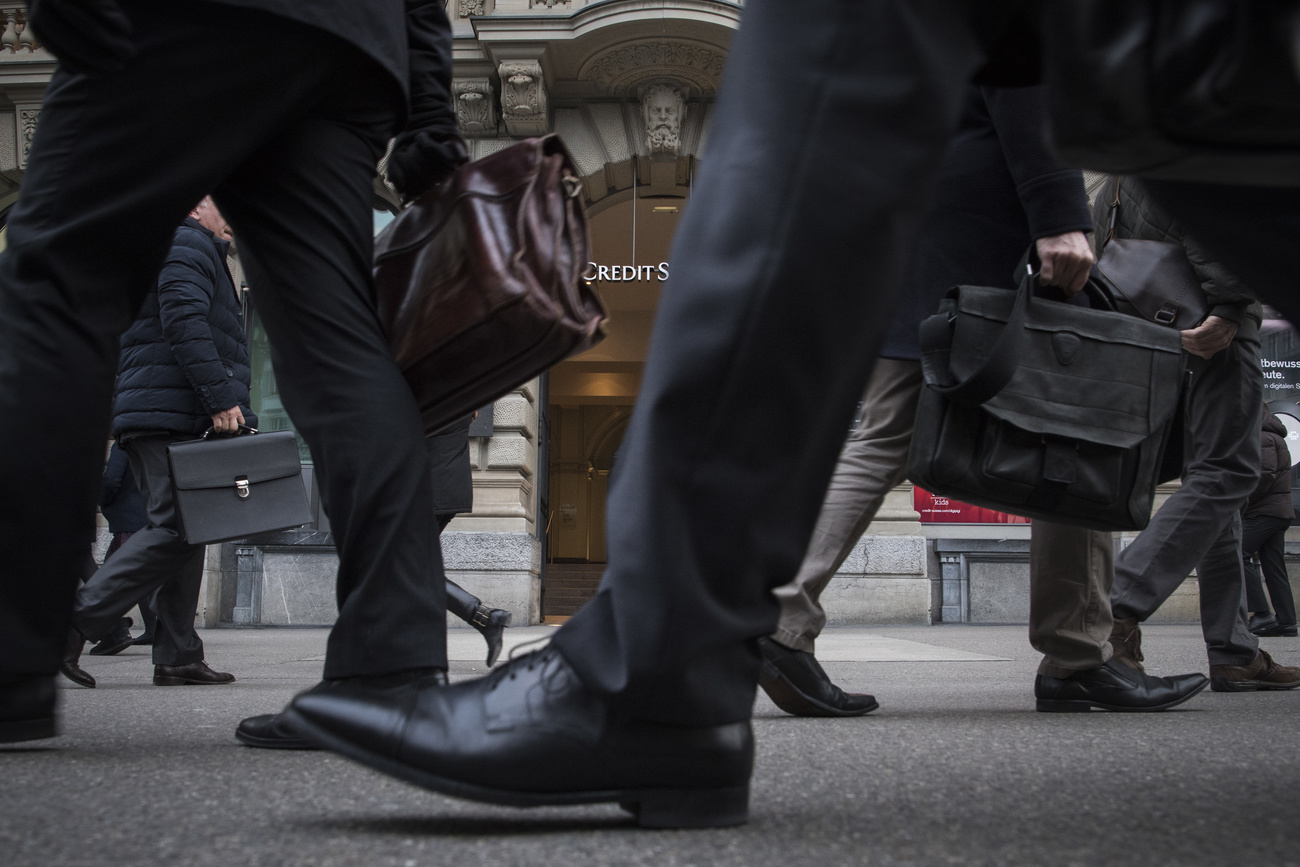António Horta-Osório: ‘Lloyds was about to die’

Next week, after a successful 15-year spell in the UK, António Horta-Osório will board a plane to Zurich hoping to have a similar impact in Switzerland. Here he has 'Lunch with the FT'.
When the Portuguese banker made Britain his home in 2006, he was a relative unknown, dispatched by Spain’s Banco Santander to run its new UK arm, the former Abbey National. But in the years that followed he has become a pillar of the British establishment, as few foreign bankers have: he was picked by the Chancellor of the Exchequer to bring the part-nationalised Lloyds Bank back from near-death; he was granted a plum role on the governing court of the Bank of England; and from day one he has played tennis at that sporting icon of the ruling class, Queen’s Club in West Kensington.

Along the way, he bought a £4 million (CHF5 million) house in Chelsea, was appointed chair of the Wallace Collection of fine art and, much to his delight, has become a British citizen. He has also worked so hard and in such stressful circumstances that on one occasion he had to be signed off work – and he has experienced the full force of the tabloids turning their attention on his private life.
Appropriately enough, we are having lunch at Scott’s in Mayfair, the acclaimed seafood restaurant that has quickly drawn back its pre-pandemic mix of high financiers and look-at-me celebrities. It is a chilly but sunny day and one of the first since the mid-April lockdown easing that allowed outdoor dining to resume. The exuberance of the liberated guests on Scott’s terrace seems to have infected the 57-year-old and famously suave Horta-Osório, prompting an outpouring of affection for the home he will soon leave.
“When I was appointed to the Court of the Bank of England, I felt people here had adopted me. I felt very much part of you, part of London, part of the UK.”
As if to prove the point he has ordered a staple of the Scott’s menu, dressed crab, to start, followed by Dover sole and a side order of spinach – austere in comparison with my steamed asparagus, plus mushroom risotto.

More
How Credit Suisse rolled the dice on risk management — and lost
Only last year, Mervyn King, the former BoE governor and a fellow tennis fanatic, hailed Horta-Osório’s achievement at having turned Lloyds “from a liability to the taxpayer into an asset for the country”. Though Lloyds’ share price trails below the level of a decade ago, thanks in large part to the economic challenges posed by Brexit and Covid-19, Britain’s biggest high street bank looks safe and well run, when once it teetered on the brink of collapse. In 2009, the government had taken a 43% stake in exchange for more than £20 billion of rescue financing.
‘Unforgettable moment ‘
Asked to identify the high point of his time in charge, Horta-Osório pinpoints the final act of reprivatisation after eight long years. “It was an unforgettable moment when I got the call from [senior Treasury official] Charles Roxburgh on May 17 2017 saying: ‘Antonio, we’ve sold the final shares.’ It was 4.40 in the afternoon.” By 5pm the bank’s ninth-floor conference room was packed with staff to hear the news. “I said: ‘Look guys, we did it. We gave the taxpayers’ money back. And it’s a great tribute to you.’ We made a toast. It was a really good moment.”
I decide to ruin the recollection. While Horta-Osório is a success story par excellence in establishment circles, his tenure has attracted controversy in other areas. Later, over our main courses, we will discuss some of his more contentious business wranglings. But for now I want to focus on whether his sense of being adopted by British society wasn’t shattered by the only time he’s ever featured on the front page of The Sun newspaper.
For Sun readers at least, Horta-Osório will forever be associated with “Lloyds Bonk”, the classic tabloid headline over the story of how the boss of the UK’s biggest high street bank had been caught on camera conducting an extramarital affair while on a business trip to Singapore.
Did a tabloid sting not darken his view of the UK? “Everyone makes mistakes in life,” he begins in lowered tones. I have known him for many years and have met his wife and children. But for all the many exchanges we’ve had about everything from bank branches to topspin backhands, I’ve never known him stray into such deeply personal territory. I had half-expected him to stonewall, betray a flash of anger or at least insist we go off-the-record, as he often likes to do when discussing other banks and bankers.
Instead, he channels his religious upbringing. “Do you know the story of when a group of men were going to stone Mary Magdalene to death? And Jesus came, put his arms around her and said: ‘Those of you that never sinned, throw the first stones.’ And they all left.”
I mutter recognition, but he wants to conjure another hero. “As Nelson Mandela said, the point isn’t not to fall, it’s to rise every time, learn your lessons and always be better and do better.”
Low point
My crisp asparagus has a pleasantly bitter tang, offset by a creamy hollandaise. Horta-Osório declares his crab as “one of the best I know of”.
For all his philosophising, friends say the incident may have scuppered his chance of a knighthood or other honour, while a shot at the leadership of HSBC also evaporated.
That the financier should acknowledge failure or weakness – let alone open up about an example of it in his personal life – would have been unthinkable a few years ago. When he was appointed chief executive of Lloyds in early 2011, he knew he faced a big job – the bank had been part-nationalised after a botched government-encouraged rescue of rival HBOS. But by the autumn, as the eurozone crisis threatened to freeze funding markets again as had happened in 2008, Horta-Osório began to realise the challenge might be unmanageable.

More
Thomas Gottstein: Credit Suisse boss buffeted by series of crises
“Lloyds was about to die,” he recalls as he cuts precisely into his sole and forks a neat square. This, he acknowledges, was the low point of his professional life: faced with the stress of knowing that £200 billion of short-term funding might not be refinanceable, and that the only way out would have been to go cap in hand to chancellor George Osborne for another bailout, he collapsed. Having appeared glassy-eyed and unable to focus for months, he was diagnosed that October with stress-related exhaustion and sent to the Priory clinic to recover.
“The reason why I really stopped sleeping is because I could see that the bank could die. I could not share this with anyone. I took it really to heart as my responsibility to save it.”
Even now he is wary about talking so frankly on the record. At the time, honesty was impossible. “You can’t share these things, because if you share, the confidence in the bank evaporates and you’re dead. So, it was very personal. I felt it very heavily.” As time has passed, however, Horta-Osório has begun speaking out. Lloyds now supports the charity Mental Health UK and has made help available for staff experiencing stress and anxiety.
Improvement mission
His sense of duty and self-reliance, as with his biblical defence of human frailty over his affair, traces back, he says, to his early years in the Jesuit school in Lisbon. “I have been educated to help others, to serve others. [It is] a moral obligation.” PR guff? Many may roll their eyes at a banker making such high-minded claims. But in Horta-Osório, it is hard to deny a depth of feeling. “What drives me always through my life is a constant obsessive impulse to try to do better: to make society better, to make banks better, to make people better.”
The improvement mission underlines his reputation for a command-and-control management style. But, in his telling at least, it also explained an early consumer-friendly decision – to break with the banking industry’s ranks, which until 2011 had resisted accusations that payment protection insurance policies had been endemically mis-sold to millions.
When the new Lloyds boss set aside £3.2 billion to compensate mis-selling victims in early 2011, he made enemies of every other bank boss, many of whom had been determined to fight the issue in the courts. He also thought he was being conservative relative to regulators’ estimates of a potential £4.5 billion industry-wide bill. It was a “matter of principle, not a matter of money”, he insists. He goes further, claiming a second even grander motive: to force reform on banks that had relied on selling large volumes of bad products to mask inefficient cost management.
“I thought this would make the UK banks focus on the customers, as they should, and reduce costs in the right way and become efficient.” To some degree that has happened – at Lloyds more than most. But it was an expensive punt: Lloyds’ final bill for PPI mis-selling has actually run to £22 billion, not far off its entire market capitalisation.
What of other Jesuitical instincts, I ask, relishing my nutty risotto, with salty spongiform wild mushrooms. Shouldn’t the mission to do good and be better extend to how you treat your customers? The PPI mis-selling predated Horta-Osório’s tenure. So did the fraud at HBOS Reading that left nearly 200 business owners destitute or at least out of pocket, but that scandal festered for years when he was in charge. Even after recent efforts to step up compensation payouts and conduct inquiries into mistakes, the bank has been slammed for being offhand at best and callous at worst.
Unruffled, he insists his legal advice was that the suspension of a regulatory probe while police investigated meant the bank could not continue its own detective work. He concedes one point: “We could and should have been more empathetic with customer complaints.”
What, too, about bankers’ pay? Shouldn’t the austerity drive extend to that? Horta-Osório has earned an aggregate £60 million during his time at Lloyds. I ask whether on this count he admires his old friend and rival Andrea Orcel, just appointed as chief executive of Italy’s UniCredit, more than Jean Pierre Mustier, whom he replaced. Mustier famously took a large pay cut in recognition of UniCredit’s lacklustre performance and to align his remuneration more closely with stakeholders’; Orcel recently secured narrow shareholder backing for a €7.5m annual pay deal, one of the most generous for any European bank boss.
Credit Suisse
Skewering the last of his fish (“perhaps the best sole in the world, even better than in Portugal”), and following up with a token mouthful of spinach, Horta-Osório dodges the “people question”. I suspect he thinks Orcel was hard done-by when Santander backtracked on a deal to hire him as chief executive – triggering an ongoing €112 million (CHF124 million) courtroom showdown. He smiles enigmatically as I muse that the UniCredit package may already feel like victory to Orcel: it is set to be worth more than Santander chair Ana Botín’s, after she agreed last year to donate a large chunk of her pay to back a Covid-19 response initiative, leaving her with only €6.8 million.

More
Credit Suisse lurches from one risk management crisis to the next
Predictably, Horta-Osório declines the offer of pudding, leaving me to feel indulgent for ordering a plate of fruit. As our espressos arrive – Horta-Osório’s first concession to anything beyond fine but frugal sustenance – I return the conversation to the topic that had occupied our exchange for the first ten minutes, following my breathless arrival by bike: fitness.
Again the Jesuitical discipline is on display. “I have been running 5km early mornings, four times a week, together with intermittent fasting. No breakfast four times a week.” He lost 3kg that he’d wanted to lose for years and says the exercise and diet routine sharpened his mind.
Does he fear that his new job, as chair of Credit Suisse, will be a repeat of the stressful early years at Lloyds? Since he agreed to take the role, the Swiss bank has become embroiled in scandals relating to collapsed lender Greensill Capital and family office Archegos. It has taken a CHF4.4 billion ($4.8 billion) writedown and announced a SCHF1.7 billion capital raising.
We opt for a second round of hot drinks – a signature green tea for the banker, a mint tea for the journalist – as Horta-Osório insists he feels none of the dread that plagued him a decade ago. He refuses to engage in discussion of Greensill or Archegos, other than to say he has a clear idea of what needs to happen and to imply support for the current leadership. “They have an outstanding franchise, contrary to what happened with Lloyds ten years ago . . . and outstanding macro trends,” he says, alluding to the bank’s strong presence in Asia and wealth management. “That’s very different from Lloyds being about to die before the eurozone crisis.”
When Horta-Osório left Santander, much was made of the resultant rupture with the Spanish bank’s revered chair, Emilio Botín. Yes, the relationship was difficult for a while, Horta-Osório concedes, but they ended up corresponding by letter right up to his death seven years ago. So will Botín’s style of chairmanship – obsessed with detail of the bank’s risks, while also granting autonomy to managers around the world – be a template for him at Credit Suisse?
Yes, he says. “Emilio Botín was by far the best executive chair I have ever met.” What made him great? “The capacity to allow great people around him, [something] many [bosses] are afraid of. And he always paid his people better than himself, which I thought was a great example.”
Had Horta-Osório fulfilled an alternative destiny, he might be in the top job at Santander in Spain – with an opportunity to pursue an sideline ambition of meeting, and even pitching for a game, with tennis player Rafael Nadal. “From a competitive point of view, Nadal is my idol: I have never seen somebody that really excels so much through effort.” (Aside from his much-trumpeted sense of duty, brute competitiveness is crucial to who Horta-Osório is: he can’t resist pointing out that during his ten-year tenure at Lloyds, Barclays, RBS and HSBC have each got through three chief executives. He puts it down to his father, a champion table tennis player.)
Zurich is hardly a bad option on the tennis front, too. By good fortune, Nadal’s arch-rival Roger Federer is sponsored by Credit Suisse. For Horta-Osório, another challenge beckons.
Copyright The Financial Times Limited 2021

In compliance with the JTI standards
More: SWI swissinfo.ch certified by the Journalism Trust Initiative








Join the conversation!